How to Hire the Right Residential Structural Engineer
How to Hire the Right Residential Structural Engineer
It can be challenging to know if or when the services of a residential structural engineer are needed.
To get a better understanding, it’s essential to know what a residential structural engineer does and the benefits that come from their services.
This article will explain both of these in detail, as well as how to find the right residential structural engineer for your project.
What is a Residential Structural Engineer?
Professionals who provide civil engineering specializing in human habitation structures are called residential structural engineers.
A residential structural engineer has a professional license (the highest level of this type of license) with a specialty in residential structures.
To accomplish this, they must have obtained a degree along with particular certifications.
What Are the Responsibilities of a Residential Structural Engineer?
When you hire a residential structural engineer, you can expect them to provide the following services:
Design Building Plans
They will consider the size of your family, your lifestyle, your budget, and the location of your home to create a functional blueprint for the project.
Oversee Construction Projects
These professionals ensure the home builder follows the building codes set forth by the local authorities by overseeing their work and performing periodic inspections.
They also help ensure the contractors and subcontractors choose the right materials for the work they will be performing on your home.
Evaluate Construction After Completion
After your new home construction or renovation project is complete, residential structural engineers will check the structural stability of the work completed by all who have laid a hand on your home.
Assess the Structural Integrity of a Home Outside of Construction
After a natural disaster, fire, or pest infestation, a residential structural engineer may be needed to assess the extent of the damage. They may determine that the home is unsafe for habitation.
Residential vs. Commercial Structural Engineer
Residential structural engineering focuses on single-family homes and multi-unit dwellings, while commercial structural engineers focus on stores, offices, malls, etc.
Residential structural engineers mainly just advise the homeowner. Commercial ones provide project management, which involves a much larger scope of work.
When Do You Need to Hire a Residential Structural Engineer?
These services are required for the following types of projects:
New Construction
Home building companies will hire a residential structural engineer to sign off on the floor plans they offer. If an individual is having a custom home built, a residential structural engineer will need to be consulted to ensure the building plans are structurally sound.
Home Renovations or Remodels
Some home renovations or remodeling projects are relatively simple and won’t require the services of a structural engineer, such as:
Painting
Cabinet work
Minor plumbing fixture upgrades
Floor installations
Other renovations demand the expertise of a residential structural engineer, including moving walls or heavy structures, especially load-bearing wall removal. A residential structural engineer can also aid in finding suitable building materials for renovations to stand the test of time.
Related: Structural Remodels - What to Know
Additions
When adding a room to your home or building on your property, a residential structural engineer is needed to ensure it won’t overload the rest of the structure and will have the stability it needs to stand.
The same is true if you are building out and adding more square feet to your home. A residential structural engineer can ensure this extra living space is structurally sound and won’t add excess stress to the current building.
Adding a whole floor to a home is incredibly tricky and requires the help of a residential structural engineer.
External Additions
While the section above discussed additions to the inside of a home, exterior add-ons like solar panels or skylights will also require the expertise of a structural engineer.
They can tell you where to place these features in order to maintain the strength of your roof, or if they might not be the best idea for the roof’s integrity.
Installing a deck or covered porch could also put unnecessary strain on the rest of the home if not done correctly. Bay windows could cause the same negative results.
However, a residential structural engineer overseeing these additions would remove these risks.
Some homes may be undergoing threatening damage from unsound soil. A residential structural engineer can help design a retaining wall to create a sturdy foundation.
Detached Building
Building a shed, garage, or mother-in-law apartment on your property should include the services of a residential structural engineer to ensure their adequate strength and durability.
Buying a New Home
Residential structural engineers can be helpful in the home buying process by aiding in home inspection. Before real estate purchases, these professionals can help determine whether structural problems would make the building risky for the home buyer.
The residential structural engineer will perform a structural analysis by assessing the existing structure for any damage. They can also perform a thorough foundation inspection.
Repairing Structural Damage
There are, unfortunately, many ways a house can sustain damage, such as from a storm, a fire, or accidental property damage. They may also fall into disarray due to poor construction or simple neglect. Drainage issues on the property can also cause extreme damage to the foundation of the building.
A residential structural engineer will assess these issues and provide a plan to repair them.
Installing Very Heavy Objects
A home is designed to sustain a normal everyday load. However, sometimes, the homeowner brings in an object that surpasses the typical load placed on a residential floor.
When this is the case, extra support is needed. How much support and where it must be placed can be correctly determined by a residential structural engineer.
Examples of heavy objects that would need extra support include:
Grand piano
Jacuzzi
Large fish tank
Hot tub
Pool table
Marble counters
Benefits of Hiring a Residential Structural Engineer
When a residential structural engineer advises you on your new home construction or addition, you will gain many benefits, including:
Peace of Mind
When it comes to a robust and sturdy building, there is no guesswork from a professional engineer. They are highly knowledgeable in their field and have a duty to uphold.
Failure to be thorough at their job could result in loss of life. They do not take shortcuts or cut corners.
Having this professional oversee your residential project will provide a basis for trust while living in your home.
Financial Comfort
Hiring a residential structural engineer can also help you save or make money.
For example, selling your home for more money is a possibility. Their engineering report proving your home is structurally sound can be used during price negotiations.
It can also explain how many repairs are needed and their estimated cost.
Hiring a structural engineer when constructing your home can save money by reducing the need for repairs. Houses designed by a structural engineer will hold up longer.
They can also assist in catching repairs early, such as foundation repairs, sloping floors, or cracks in the walls. The earlier you find and fix the structural problems, the less it will cost.
Residential structural engineers can also ensure you stay within budget on a new construction project by providing realistic plans and finding the best materials for the given price.
Safety
Residential structural engineers make sure the structural design meets building code requirements. Staying close to building regulations keeps your family and friends in your home safe from injury.
Personalized Designs
The personalized design provided by the architect is realized with the aid of a structural engineer, who makes that design feasible with a custom structure.
These design plans with a layout based on your needs and lifestyle are optimized to make your life more comfortable. Specifically, structural engineers will work with the architect to make adjustments to:
Noise reduction
Energy efficiency
Natural light and ventilation
Maximize space
Improve functionality
Aesthetics
Read more: The Advantages of A&E Firms in Today’s Construction
How to Find the Right Structural Engineer for the Job
Not all residential structural engineers are equal. How can you ensure you hire the best one for your residential project?
Here are several factors to consider:
Recommendations
When you are in need of the services of a residential structural engineer, you should consult your family, friends, and colleagues to see if they have any recommendations for engineers they have used in the past. They could also tell you if they have had any negative experiences and who to stay away from.
Experience
Not to say that new engineers can’t be formidable professionals, but generally, the more experience a structural engineer has, the better equipped they are to tackle any project.
You should also check the types of projects they have experience with. Look at their portfolio for a better understanding of what they have accomplished.
Additonally, some residential structural engineers have done more work in a certain specialization, such as restoring historical homes, sustainability and green homes, or luxury homes.
Licensure
A structural engineer’s degree, certifications, and licenses can give you insight into their expertise and dedication to furthering their career. They should also have current insurance to protect both parties in a difficult situation.
Collaborators
Connections with architects, contractors, home inspectors, and interior designers show how many good relationships they have established throughout the years.
More connections show how well they have established good communication skills and teamwork. Engineers with these skills will be more willing to keep you in the loop with updates while being attentive to your needs.
Cost
Lastly, you’ll want to consider the engineer’s fee, which must fit into your budget. However, you can’t expect high-quality work with little investment.
Engineers that charge a flat fee can provide you with an estimate of the total cost of their services no matter what happens during the project. For those that charge an hourly rate, you will want them to estimate the hours the project will take to understand how much their services will cost.
Recap
The benefits of hiring the right residential structural engineer highlighted in this article certainly prove the value of their services.
Whether you are constructing a home from the ground up, making renovations, or making additions to your property, it is wise to enlist the help of a residential structural engineer.
Contact ZP Architects & Engineers today for top-notch residential structural engineering services to ensure your home is safe, functional, and efficient.








